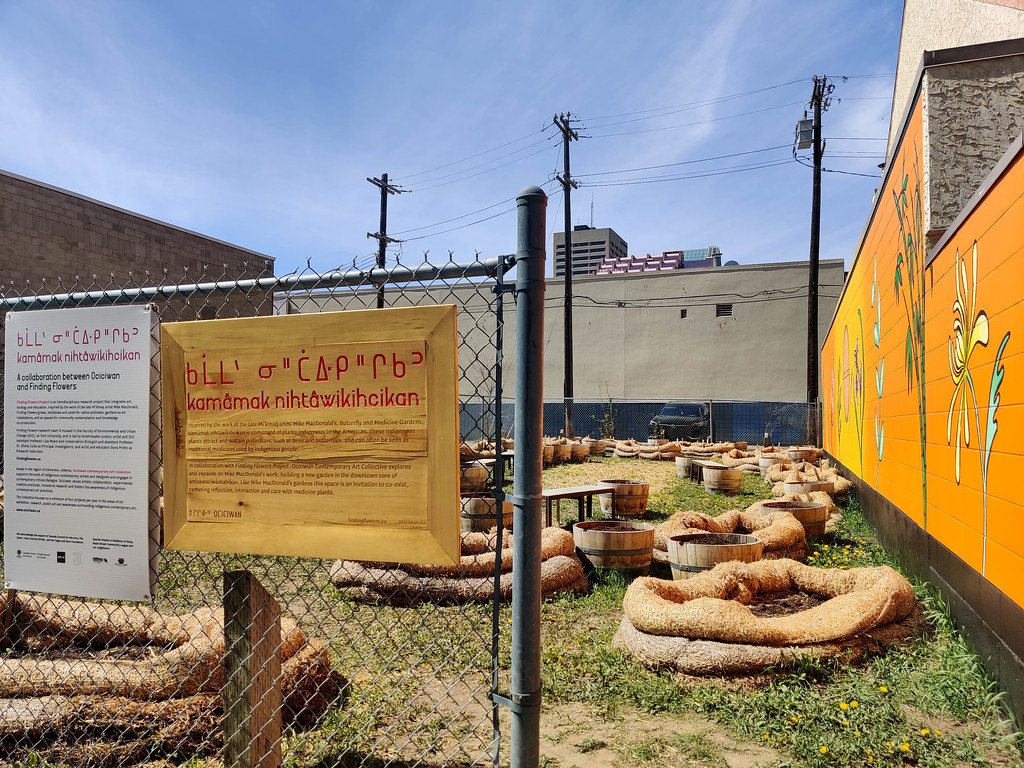A garden designed to attract local pollinators and provide space for reflection and knowledge-sharing among visitors is returning to the Boyle Street community for a second summer.
Located at 10146 96 Street, kamâmak nihtâwikihcikan is a collaboration between the Ociciwan Contemporary Art Collective and the Finding Flowers Project, a York University-based research project. It will be open to the public from June 4 to Oct. 31.
Ociciwan is hoping to increase the presence of medicinal plants this year and further adapt to meet the needs of the community.
"This year, we expanded a little bit more. We're trying to get more traditional medicines, like sweetgrass and sage. But also to include some herbs that folks could use," said Becca Taylor, Ociciwan's executive director.
"I think with each year new things could be introduced. The community has talked a lot about food to us, and I think it'd be really interesting to introduce more food plants as well, as we build capacity and as the community takes a little bit more ownership of the space as it grows."
Part art installation and part sanctuary, the installation was designed by interdisciplinary artist and Ociciwan core member Tiffany Shaw. It expands on the work of the late Mi'kmaq artist Mike MacDonald, who created a series of butterfly and medicine gardens beginning in the 1990s.
"Mike MacDonald gardens are so rich and have really complex thought about relationships with pollinators, but also really deep reflections on colonizing plants that have been introduced into our landscape as well," Taylor said.

A butterfly garden planting party will be held at kamâmak nihtâwikihcikan on June 4, and the Boyle Street amenity will be open to the public until fall. (Mack Male/Flickr)
MacDonald's insight into the connections between flowers, pollinators, and people was unique, and that body of knowledge was only incompletely recorded before his death in 2006, creating hurdles for those wanting to replenish and carry on his work.
"He was very purposeful in the way he selected plants. We don't have the same knowledge set that he did," Taylor said. "We have heavily relied on his lists. And the plants that we don't have access to or are really hard to find, we've worked with horticulturalists and greenhouses to select plants that have a lot of distinct properties in order to encourage pollinators like butterflies to come."
Massive declines in pollinator populations have been reported globally, with insects facing overlapping threats from disease, climate change, parasites, and habitat loss. Because some species of pollinators have evolved to rely on a small selection of local flora, they are especially vulnerable to environmental changes.
"Bumblebees, for example, are what we call generalists. They will forage on pretty much whatever is available. But then we have specialist bees that rely on either a group of native plant species or individual native plant species entirely for their food," said Megan Evans, president of the Alberta Native Bee Council, a non-profit dedicated to the research and conservation of the province's native bees.
"Having the native plants that they rely on and evolved with is critical having those bees because if those plants aren't there, they really don't adapt well to forage on other species. They're gone."
The best thing that can be done to create habitat for pollinators, Evans said, is to plant native flowers. "Native is always best, so that you can accommodate for those special species that have very narrow niches."
The conservation of plant and pollinator diversity is an element of MacDonald's vision that has become more important with intensifying ecological crises. Species protection, however, is inseparable from the gardens' role in preserving Indigenous knowledge and honouring traditional ways of living with plants.
In an interview with Land Views Journal, MacDonald described the beginning of his interest in this aspect of his gardens while working in north central British Colombia, recording traditional medicines and their names in Indigenous languages. He was feeling unwell and visited an Elder, who told him: "When you are not feeling good you go find a butterfly and follow it and it will lead you to a medicine that will make you better."
